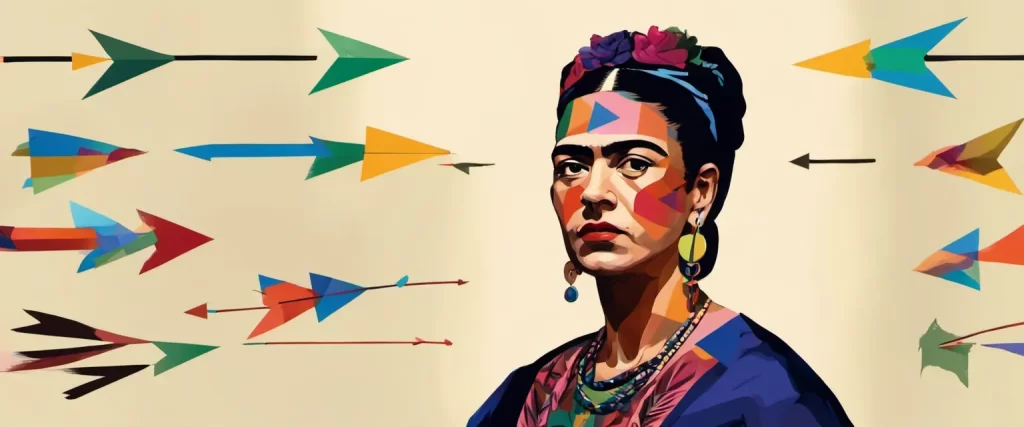Frida:Examine Feminism in Hayden Herrera’s Biography

In a world often defined by societal norms, one name stands out as a vibrant symbol of defiance and empowerment – Frida Kahlo. Hayden Herrera’s biography, “Frida,” delves deep into the life and art of this remarkable Mexican painter, offering readers a profound insight into her relentless determination to challenge gender roles and advocate for women’s rights. Through the lens of Kahlo’s tumultuous journey, this article aims to explore the profound impact of feminism on her life, art, and enduring legacy. From her unapologetic self-portraits to her bold political activism, Kahlo’s story serves as a powerful testament to the resilience and unwavering belief in the equality of women.
What is Feminism
Feminism is a sociopolitical movement advocating for the equality of the sexes, particularly focusing on the upliftment and empowerment of women. It seeks to challenge and dismantle systems of gender inequality, sexism, and patriarchy that perpetuate discrimination and oppression against women.
At its core, feminism recognizes that women have historically been marginalized and disadvantaged in various aspects of life, including politics, economy, education, and social roles. The movement aims to rectify this by advocating for women’s rights and dismantling the barriers that limit their opportunities, choices, and freedoms.
One of the key principles of feminism is gender equality. Feminists assert that all genders should have equal rights, opportunities, and access to resources, and that gender should not be a determinant of one’s worth or their ability to participate fully in society. They argue that gender roles and stereotypes, which prescribe certain behavior and expectations based on an individual’s sex, limit people’s potential and perpetuate inequality.
Feminism also highlights intersectionality, recognizing that gender discrimination does not exist in isolation from other forms of oppression, such as those based on race, class, sexual orientation, or ability. This perspective acknowledges that women with different backgrounds and identities may face unique and compounded forms of discrimination, and therefore, advocacy for gender equality must consider these intersecting aspects.
Furthermore, feminism strives to challenge and change existing power structures and institutions that perpetuate gender inequality. This involves critiquing and transforming cultural norms, social institutions, and legal systems that reinforce patriarchal values and contribute to the subjugation of women. By challenging these systems, feminists aim to create a more inclusive, just, and equitable society for all.
Feminism has evolved over time, encompassing diverse perspectives and approaches. Various waves of feminism have emerged, each with its own focus and priorities. While earlier waves primarily fought for women’s suffrage and basic rights, contemporary feminism addresses a wide range of issues, including reproductive rights, gender-based violence, pay equity, and representation in politics and the media.
Overall, feminism is a collective effort to dismantle gender-based oppression and achieve true gender equality. By challenging and changing societal norms, advocating for women’s rights, and promoting inclusivity and intersectionality, feminism seeks to create a more equitable and just world for people of all genders.
Why is Feminism Important to Us?
Feminism is important to us for several reasons:
1. Promoting gender equality: Feminism seeks to challenge and dismantle gender-based discrimination, stereotyping, and inequality. It aims to ensure that all individuals, regardless of their gender, have equal rights and opportunities in all aspects of life, such as education, employment, healthcare, and participation in decision-making processes.
2. Empowering women: Feminism works towards empowering women by advocating for their rights and amplifying their voices. It seeks to challenge and break down societal norms and expectations that limit women’s choices and potential. By empowering women, feminism helps them live fulfilling lives, achieve their goals, and contribute to society.
3. Addressing systemic issues: Feminism not only addresses individual instances of inequality but also focuses on systemic issues and structures that perpetuate gender inequality. It aims to challenge and change social, cultural, economic, and political systems that create and perpetuate gender-based barriers and discrimination.
4. Challenging harmful gender norms: Feminism helps challenge and break down harmful gender norms and stereotypes that affect both women and men. It encourages individuals to question and challenge restrictive gender roles and expectations, freeing people from the limitations put upon them based on their gender.
5. Supporting social justice: Feminism intersects with other social justice movements, such as racial justice, LGBTQ+ rights, and disability rights. It recognizes and seeks to address the intersections of gender with other forms of discrimination and oppression, promoting inclusivity and equality for all marginalized groups.
6. Building solidarity and allyship: Feminism encourages individuals to support and stand up for each other, fostering solidarity and allyship among people of all genders. It recognizes the importance of collective action and the power of diverse voices coming together to create meaningful change.
In summary, feminism is important to us because it strives for a more just, equitable, and inclusive society where everyone, regardless of gender, can thrive and live their lives to the fullest potential.
Unlocking Feminism from Frida – A Biography of Frida Kahlo

Frida – A Biography of Frida Kahlo Introduction
Frida: A Biography of Frida Kahlo” by Hayden Herrera is a comprehensive biography of the influential Mexican artist Frida Kahlo. The book explores Kahlo’s personal and artistic life, delving into her struggles, triumphs, and unique artistic vision.
Herrera begins by examining Kahlo’s childhood and the significant events that shaped her life, including a near-fatal bus accident at the age of eighteen that left her physically and emotionally scarred. The author delves into Kahlo’s enduring pain and how she channelled it into her art, transforming her physical suffering into powerful and symbolic paintings.
The biography explores Kahlo’s relationship with her husband, fellow artist Diego Rivera, who played a significant role in her life and art. Their tumultuous relationship was filled with intense love, infidelity, and political activism. Herrera provides insights into their complex union, exploring how their partnership influenced both of their artistic styles.
Moreover, Herrera highlights Kahlo’s exploration of her identity as a Mexican artist and a woman in a male-dominated art world. She sheds light on the themes prevalent in Kahlo’s work, such as her connection to Mexican culture, her exploration of physical and emotional pain, and her stance on feminism. The book also delves into Kahlo’s political beliefs and her involvement in leftist movements that shaped Mexico during her lifetime.
Overall, “Frida: A Biography of Frida Kahlo” offers readers a profound understanding of the life and art of this iconic figure. Herrera’s meticulous research and compelling storytelling reveal the depths of Kahlo’s experiences, influences, and creative genius, making this biography a must-read for anyone interested in the life and work of Frida Kahlo.
Feminism Methods
In the book “Frida: A Biography of Frida Kahlo” by Hayden Herrera, several feminist methods are mentioned that Frida Kahlo utilized in her life and art. These methods include:
1. Self-Expression: Frida Kahlo used her art as a medium to express herself authentically. Her paintings often depicted her own experiences, emotions, and struggles as a woman, addressing issues such as gender norms, sexuality, and the female body.
2. Challenging Gender Roles: Frida actively challenged traditional gender roles and societal expectations of women. She defied stereotypes by dressing in traditionally masculine attire, such as suits and pants, and embracing a more androgynous style. She celebrated and embraced her own individuality, refusing to conform to societal standards of femininity.
3. Empowerment through Art: Frida used her artistic abilities to assert her independence and assert her worth as a woman. Her art allows her to claim agency over her own experiences and body, turning her pain and struggles into sources of strength and resilience.
4. Body Positivity: Frida Kahlo often painted her own body, highlighting her physical disabilities and medical hardships. By doing so, she challenged conventional beauty standards and celebrated the diversity of the female form. Through her art, she embraced her own imperfect body and encouraged women to love and accept themselves as they are.
5. Intersectionality: Frida acknowledged the interconnected nature of various forms of oppression by incorporating elements of her Mexican heritage into her artworks. She explored themes of culture, ethnicity, class, and national identity, highlighting the intersectionality of these experiences with her gender identity.
6. Political Activism: Frida was involved in leftist political movements and used her platform to advocate for social justice and equality. She actively participated in protests, supported workers’ rights, and championed causes that aimed to empower marginalized communities, especially women.
These feminist methods employed by Frida Kahlo not only contributed to her own personal and artistic development but also had a lasting impact on feminist art movements and continue to inspire women around the world.
Frida – A Biography of Frida Kahlo Quotes
Frida – A Biography of Frida Kahlo quotes as follows:
1. “I paint myself because I am often alone and I am the subject I know best.” – Frida Kahlo
2. “I never paint dreams or nightmares. I paint my own reality.” – Frida Kahlo
3. “Feet, what do I need you for when I have wings to fly?” – Frida Kahlo
4. “I am my own muse, the subject I know best.” – Frida Kahlo
5. “I love you more than my own skin.” – Frida Kahlo (referring to her husband, Diego Rivera)
6. “I paint my own reality. The only thing I know is that I paint because I need to, and I paint whatever passes through my head without any other consideration.” – Frida Kahlo
7. “They thought I was a Surrealist, but I wasn’t. I never painted dreams. I painted my own reality.” – Frida Kahlo
8. “I drank to drown my sorrows, but the damned things learned how to swim.” – Frida Kahlo
9. “I tried to drown my sorrows, but the bastards learned how to swim.” – Frida Kahlo
10. “I hope the leaving is joyful; and I hope never to return.” – Frida Kahlo (in her last diary entry before her death)

More Books About Feminism
In a world filled with diverse perspectives and untapped stories, feminism has emerged as a powerful force driving change and challenging societal norms. This book recommendation encompasses a selection of five empowering books that delve into the nuances of feminism, highlighting the brilliance of women authors and activists. From classical works to modern-day narratives, these books offer a captivating journey through the evolution of feminism, highlighting various struggles and triumphs faced by women throughout history.
1. “Pride and Prejudice” by Jane Austen:
Jane Austen’s timeless classic, “Pride and Prejudice,” may not seem overtly feminist at first glance, but its underlying themes of female empowerment, independence, and rebellion against societal expectations resonate strongly. With Elizabeth Bennet as the fiercely intelligent and determined protagonist, Austen challenges the norms of her time, highlighting the importance of female agency in marriage and relationships.
2. Jane Eyre” by Charlotte Brontë:
Written by Charlotte Brontë, “Jane Eyre” also explores the empowerment of women, though in a more gothic and unapologetically feminist manner. The novel follows Jane Eyre, a strong-willed and fiercely independent protagonist who defies societal expectations, refusing to let a disadvantaged background dictate her future. Brontë’s writing presents Jane’s journey as a fight for equality, exploring themes of resilience, self-discovery, and finding one’s identity outside the confines of gender norms.
3. Notorious RBG” by Irin Carmon and Shana Knizhnik:
In the modern-day context, “Notorious RBG” takes readers on an insightful journey into the life of Ruth Bader Ginsburg, a trailblazing feminist icon and Supreme Court Justice. Through poignant interviews, personal anecdotes, and an engaging narrative, Carmon and Knizhnik celebrate Ginsburg’s lifetime of work, showcasing how she fiercely fought for women’s rights and gender equality. This book is an inspiring testament to RBG’s unwavering commitment to justice and her significant impact on the feminist movement.
4. “Frida: A Biography of Frida Kahlo” by Hayden Herrera:
Despite not being familiar with this specific biography, Frida Kahlo’s life and art hold great value within feminist discourse. Hayden Herrera’s biography captures the essence of Frida Kahlo’s extraordinary journey, marked by resilience, rebellion, and self-discovery. As one of the most prominent female artists of her time, Kahlo’s work encompasses themes of pain, identity, and sexuality, breaking free from traditional norms and making a significant impact on the feminist movement through her art.
5. “We Should All Be Feminists” by Chimamanda Ngozi Adichie:
Closing the list with a contemporary work that continues to resonate strongly today, “We Should All Be Feminists” by Chimamanda Ngozi Adichie offers a concise and powerful exploration of feminism in the 21st century. Based on her 2012 TED Talk, Adichie passionately addresses the significance of embracing feminism for all genders. In this beautifully written essay, she skillfully dismantles gender stereotypes and encourages society to strive for gender equality, making this book a must-read for anyone interested in the ongoing feminist conversation.
This book recommendation is a celebration of feminist literature, spanning classical and modern works that explore the struggles and achievements of women throughout history. From the timeless tales of Jane Austen and Charlotte Brontë to the inspiring biographies of Frida Kahlo and Ruth Bader Ginsburg, these books offer diverse perspectives that ignite conversations on gender equality and empower readers to challenge societal norms. Through their unique narratives and thought-provoking themes, these books will undoubtedly leave a lasting impression on all who read them.


1 Comment
Pride and Prejudice: Feminism at Its Core · 01/05/2024 at 10:08
[…] the extraordinary life and impact of Supreme Court Justice Ruth Bader Ginsburg. Celebrated as a feminist icon and advocate for gender equality, Justice Ginsburg’s unwavering dedication to women’s […]